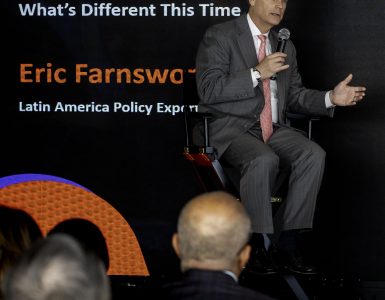Mexico is gearing up for what analysts call a tough negotiation with the Donald Trump administration over the North American free trade pact (USMCA), which comes up for review in July next year.
“It’s going to be tough,” said William O. London, Partner at Kimura London & White LLP, a U.S. law firm based in Irvine, California.
The talks will unfold as President Trump pushes to reduce trade deficits through new tariffs. Mexico, which sends more than 80% of its exports to the United States, currently runs a $174 billion surplus with its northern neighbor.
But Trump’s focus goes beyond trade numbers. He is also tying in immigration and security issues — particularly drug trafficking and criminal gangs smuggling fentanyl into the U.S.
Mexican President Claudia Sheinbaum has said the two sides will address disagreements “one by one.” In February, she told reporters that Mexico would keep a “cool head” in its response and proposed creating a joint task force with Washington to handle Trump’s concerns.
Some Mexican media outlets report that Mexico no longer has the same depth of trade negotiators it had during the 2020 USMCA talks. Analysts warn that, regardless of how well the delegation performs, the final outcome will likely depend on Trump’s discretion.

“The best way to do that is by highlighting how deeply the two economies are connected and how many U.S. jobs depend on cross-border trade,” London added.
The United States sources nearly half of its fresh fruits and vegetables from Mexico, while Mexico remains the top market for U.S. farm exports. “Getting support from American companies that rely on Mexico as part of their supply chains will go a long way in making the negotiations easier,” London argued.
According to the Woodrow Wilson Center’s Mexico Institute, about 5 million U.S. jobs depend directly on trade with Mexico — especially in Texas, Arizona, California, Michigan, and Illinois. Tariffs, experts warn, threaten those same jobs by driving up costs for U.S. manufacturers dependent on Mexican parts.
“The U.S. has a lot of power because of the size of its market, but Mexico isn’t powerless. The U.S. depends heavily on Mexico for manufacturing, and any disruption would hurt American businesses too,” London pointed out.
China’s shadow over the talks
Rising Chinese investment in Mexico has become one of the most contentious issues. “The U.S. sees Chinese-owned factories in Mexico as a way to get around tariffs,” London added.
Chinese firms invested more than $2.5 billion in Mexico in 2024, bringing total Chinese FDI since 2017 to $11.5 billion, according to the Rhodium Group. Mexican industrial parks added 196 new tenants in 2023 — 46% from the U.S. and 17% from China, a 2024 survey showed.
“Any alignment with China… is a recipe for retaliation from the White House,” warned Fergus Hodgson, Director at Econ Americas and publisher of Impunity Observer, a geopolitical think tank focused on Mexico and the Northern Triangle.
“Befriending China is imprudent. China is still culturally distant, by comparison, and a much smaller trade partner. The Communist Party of China will be more inclined to corrupt Mexican institutions,” he added.
London said Mexico should act transparently about who is investing and tighten oversight of supply chains. “If Mexico can show it’s on the same page about security and fair competition, it will have a stronger hand at the table.”
He added that Mexico must enter the talks with a clear plan: “Mexico needs a clear game plan before talks even start. The government, business sector, and labor groups all have to be aligned on priorities. It’s smart to start talking with U.S. companies and lawmakers early to build support.”







Add comment